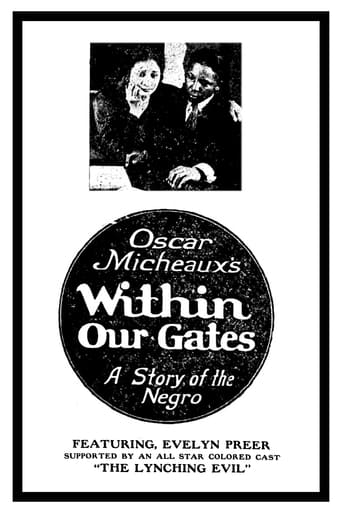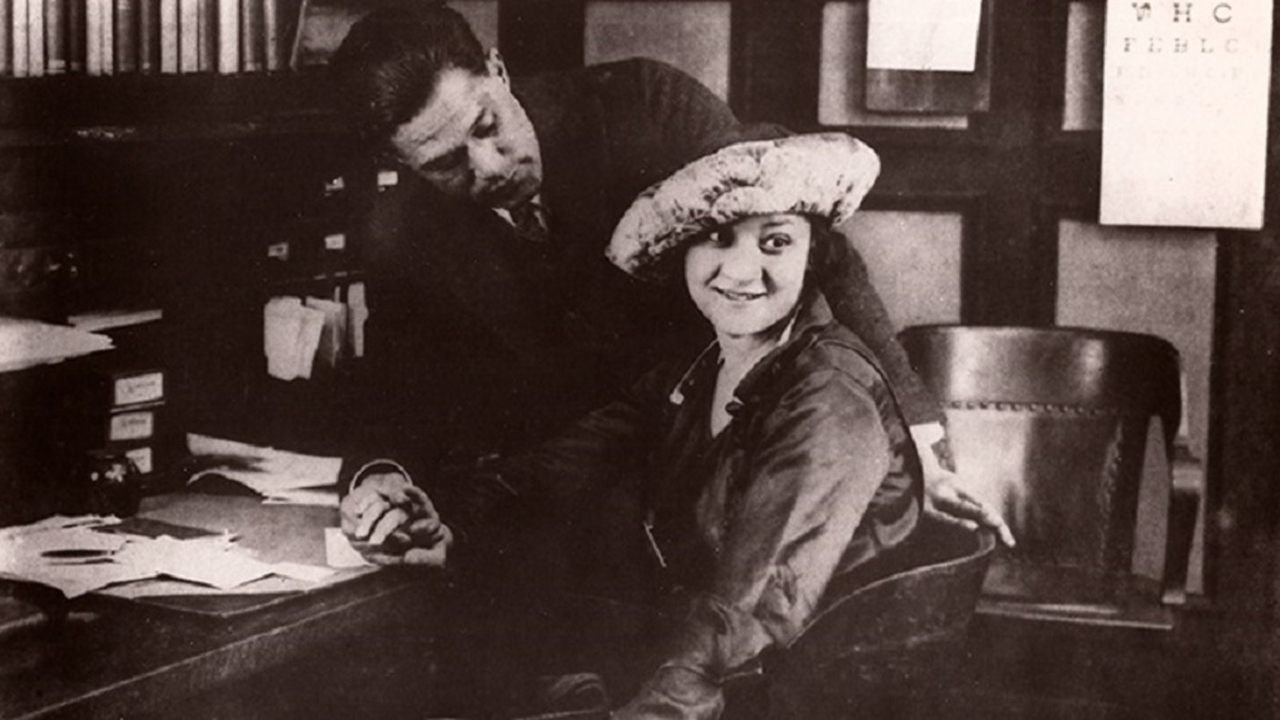Jackson Booth-Millard
I first found this silent film listed in the book 1001 Movies You Must See Before You Die, then available through the BFI (British Film Industry), I was always going to watch it, especially with the facts I read about it. Basically young African-American woman Sylvia Landry (Evelyn Preer) is visiting her cousin Alma Prichard (Flo Clements) in the north, where there is less racial prejudice compared to the deep south and her home town of Piney Woods. Sylvia is awaiting the return of her fiancé, Conrad Drebert (James D. Ruffin), so that they can marry, Alma also loves Conrad, and would like Sylvia to marry her brother-in-law, gambler and criminal Larry (Jack Chenault). Alma creates a compromising situation for when Conrad returns, he subsequently leaves for Brazil, abandoning Sylvia, while Larr murders a man during a poker game, a disheartened Sylvia returns to Piney Woods. Sylvia meets minister Reverand Jacobs, who runs the overcrowded Piney Woods School, a rural school for black children, he is struggling to cope with the small amount the state offer to give black children an education and the school faces closure, so Sylvia volunteers to try and raise $5,000. Sylvia has little success returning to the north, including her purse being stolen, but then she meets Dr. V. Vivian (Charles D. Lucas), who helps her recover her purse. Sylvia saves the life of a child playing in the street, almost being hit by a car herself, the car owner is wealthy philanthropist Mrs. Elena Warwick, who is sympathetic to her quest and offers to donate the $5,000 she needs. Her bigoted Southern friend Mrs. Geraldine Stratton (Bernice Ladd) tries to discourage her, but Mrs. Warwick increases the donation to $50,000, with her job done Sylvia makes her way back to Piney Woods. Dr. Vivian has fallen in love with Sylvia, he goes to Alma to try and find her, and through flashbacks, she tells him all about her shocking past. Sylvia was adopted and raised by a poor black family, her adoptive father Philip Gridlestone (Ralph Johnson) was accused of the murder of an unpopular but wealthy white man, because of this the family was lynched, Sylvia escaped and was almost raped, Gridlestone's brother discovered Sylvia was the mixed-race daughter of Philip. After hearing about her life, Dr. Vivian meets with Sylvia, he encourages her to be proud of the contributions African Americans have made to her country, he professes his love for her, and the film ends with them getting married. Also starring William Smith as Detective Philip Gentry, William Stark as Jasper Landry, Mattie Edwards as Jasper's Wife, E.G. Tatum as Efram - Gridlestone's Servant, Grant Edwards as Emil Landry and Grant Gorman as Armand Gridlestone. This film was made five years after the release of The Birth of a Nation, this film is seen as a response to it, it is one of the earliest surviving films made by an African American filmmaker, it is certainly a landmark and controversial black-and- white film, with its depiction of racial violence and segregation, and historically important, a shocking but most interesting silent drama. Good!
Antonius Block
Thought to have vanished until a single Spanish copy was found in the 1970's, it's a miracle this movie still exists, and it's the oldest surviving film made by an African-American director. That in and of itself makes it very special. It belongs to the genre referred to as 'race films' – movies made by African-Americans for African-American audiences between 1915 and 1950 – the vast majority of which are sadly no longer with us.I'll say up front that the movie is a little scattered, and the acting is mediocre at best – but viewers need to realize this was par for the course for movies in 1920, and this is a rare film from the period that actually has something to say. One of Micheaux's messages is that African-Americans need to be educated and to be allowed to vote in order to rise and have any real power in a country dominated by whites – a country that he still believed in despite its racism, that African-Americans had recently fought for in WWI (albeit in segregated troops), and one he points out they were never immigrants in.In the film there are whites who want to help, and quite generously, and there are also whites who want to keep African-Americans in their place, rationalizing that this will keep them happier, that they have no capacity for anything other than field work. The thought of women's suffrage (which would finally pass into law later in the year the film was released) is repellant to one white woman because she fears African-American women would also have the right to vote. Even more notoriously, there is a mob of whites who lynch a black family, as well as one who attempts rape in scenes which are both powerful and absolutely harrowing. Micheaux shows us the cruel injustice of what were common practices, an ugly part of our history that is hard to acknowledge even today. When the film was released, it was highly controversial for those scenes, and banned or edited in some places.What I was a little surprised by was Micheaux also showing us the negative effects of several African-Americans on their own culture – there is a gambler and thief known as "The Leech", a preacher who urges his congregation to be happy with their place in life because the country belongs to the white man and Heaven will be their reward instead, and a servant who incites whites with misinformation. The latter two endure humiliation with a smile, and Micheaux gets across the point that these variations of 'Uncle Tom' are selfish, helpful to themselves in the short term, but harmful to the culture. I took it as a brilliant call for strength and unity.Micheaux can't help himself in giving some of the characters what they deserve, examples of which are the actual killer for the murder being pinned on an African-American being shot in the hunt, and a little African-American boy escaping the lynching on horseback. While artistically some of these seem questionable, in this case they're probably necessary, because the film would have been far too depressing otherwise.Silent movies from this time period are often hard to watch, they come across as quaint and dated, and the filmmaking seems amateurish by today's standards. 'Within Our Gates' is certainly flawed, but it's a priceless expression of the African-American experience in 1920, and should be seen.
Michael Morrison
Oscar Micheaux is one of my motion picture heroes.With courage and determination, he set out to make movies for and about black people when it wasn't otherwise much done.He was a pioneer in independent film-making, raising money in the most unusual places and unusual ways.He deserves a lot of praise ... but, alas, his results were too often disappointing."Within Our Gates" has a lot of potential, but most of it is unmet.The acting is pretty good, but the camera work and editing are lacking; and the script misses badly.The story is a good one, and the school that is at the heart of a major subplot has a real-life counterpart: Professor Laurance Jones created a school for the black people of the piney woods near Jackson, Mississippi, in the very earliest years of the 20th century.Professor Jones' story is incredibly inspiring and I urge everyone who cares about spirit and courage to take a look (http://www.antiqbook.com/boox/vol/21991.shtml is one source).Micheaux and Jones have somewhat parallel lives, though Jones ultimately achieved recognition in his lifetime.Micheaux should have, and I am grateful beyond words that at least his films are finally being seen by a wider audience.They are flawed, yes, but they present two stories we all need to know about: The actual topic of the movie, and that of Micheaux himself.The ending of this movie is, frankly, beyond my comprehension. It seems to come out of thin air, and I fear it must have been hastily tacked on in order to placate someone. Too bad, but still the movie is historically valuable.This is added June 10, 2015: There is a print available at YouTube.com, https://www.youtube.com/watch?v=h1E0NrcnwAEI haven't watched more than a few seconds, but so far it's a terrible print.
MartinHafer
So often, Black-American cinema during the 1920s-40s is second-rate due to their exceptionally tiny budgets. While Hollywood had an abundance of money, films designed for Black audiences were generally made on shoe-string budgets with low production values. Despite this disadvantage, this early film (according to the video jacket, the oldest known Black-produced film) actually has a very contemporary look--on par with many of the mainstream movies of the day.The film is the story about a woman who has a sordid past--just exactly what that is you only learn towards the end. The way the film is made, it APPEARS she is a woman of loose morals, though this is deceiving. This woman, despite her baggage, really is a very decent person--dedicated to educating poor Black children in the South. She spends much of the film working with these people and then leaving the school to head up North to find finances for the failing school. Late in the film, the sordid past is revealed. Exactly what it is you'll have to see for yourself, but it includes lynchings and illegitimacy--some pretty racy stuff for the time.The film has a very strong message to encourage Black-Americans to become educated to earn self-respect and their piece of the American dream. The "good" main characters are exceptionally loyal and patriotic citizens and from time to time they are contrasted with Blacks who are less ambitious and worthless (such as the sellout preacher). Because of this, the film offers some excellent insight into the psyche of the Black community and their aspirations. This is truly an important film historically and pretty compelling viewing.


 AD
AD

